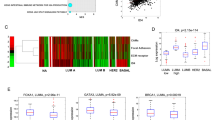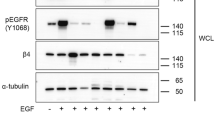Abstract
Elevated expression of the integrin-linked kinase (ILK) has been observed in a variety of cancers and has been further correlated with poor clinical outcome. Here, we show that mammary epithelial disruption of ILK results in a profound block in mammary tumor induction. Consistent with these observations, inhibition of ILK function in ErbB2-expressing cells with small molecule inhibitor or RNA interference resulted in profound block in their in vitro invasive properties due to the induction of apoptotic cell death. The rare ILK-deficient tumors that eventually arose overcame this block in tumor induction by an upregulation of ErB3 phosphorylation. These observations provide direct evidence that ILK has a critical role in the initiation phase of ErbB2 tumor induction.
This is a preview of subscription content, access via your institution
Access options
Subscribe to this journal
Receive 50 print issues and online access
$259.00 per year
only $5.18 per issue
Buy this article
- Purchase on Springer Link
- Instant access to full article PDF
Prices may be subject to local taxes which are calculated during checkout





Similar content being viewed by others
References
Ahmed F, Wyckoff J, Lin EY, Wang W, Wang Y, Hennighausen L et al. (2002). GFP expression in the mammary gland for imaging of mammary tumor cells in transgenic mice. Cancer Res 62: 7166–7169.
Akhtar N, Marlow R, Lambert E, Schatzmann F, Lowe ET, Cheung J et al. (2009). Molecular dissection of integrin signalling proteins in the control of mammary epithelial development and differentiation. Development 136: 1019–1027.
Andrechek ER, Hardy WR, Siegel PM, Rudnicki MA, Cardiff RD, Muller WJ . (2000). Amplification of the neu/erbB-2 oncogene in a mouse model of mammary tumorigenesis. Proc Natl Acad Sci USA 97: 3444–3449.
Attwell S, Mills J, Troussard A, Wu C, Dedhar S . (2003). Integration of cell attachment, cytoskeletal localization, and signaling by integrin-linked kinase (ILK), CH-ILKBP, and the tumor suppressor PTEN. Mol Biol Cell 14: 4813–4825.
Attwell S, Roskelley C, Dedhar S . (2000). The integrin-linked kinase (ILK) suppresses anoikis. Oncogene 19: 3811–3815.
Cowin P, Welch DR . (2007). Breast cancer progression: controversies and consensus in the molecular mechanisms of metastasis and EMT. J Mammary Gland Biol Neoplasia 12: 99–102.
D'Amico M, Hulit J, Amanatullah DF, Zafonte BT, Albanese C, Bouzahzah B et al. (2000). The integrin-linked kinase regulates the cyclin D1 gene through glycogen synthase kinase 3beta and cAMP-responsive element-binding protein-dependent pathways. J Biol Chem 275: 32649–32657.
Dankort D, Maslikowski B, Warner N, Kanno N, Kim H, Wang Z et al. (2001). Grb2 and Shc adapter proteins play distinct roles in Neu (ErbB-2)-induced mammary tumorigenesis: implications for human breast cancer. Mol Cell Biol 21: 1540–1551.
Dedhar S, Williams B, Hannigan G . (1999). Integrin-linked kinase (ILK): a regulator of integrin and growth-factor signalling. Trends Cell Biol 9: 319–323.
Delcommenne M, Tan C, Gray V, Rue L, Woodgett J, Dedhar S . (1998). Phosphoinositide-3-OH kinase-dependent regulation of glycogen synthase kinase 3 and protein kinase B/AKT by the integrin-linked kinase. Proc Natl Acad Sci USA 95: 11211–11216.
Engelman JA, Janne PA, Mermel C, Pearlberg J, Mukohara T, Fleet C et al. (2005). ErbB-3 mediates phosphoinositide 3-kinase activity in gefitinib-sensitive non-small cell lung cancer cell lines. Proc Natl Acad Sci USA 102: 3788–3793.
Engelman JA, Zejnullahu K, Mitsudomi T, Song Y, Hyland C, Park JO et al. (2007). MET amplification leads to gefitinib resistance in lung cancer by activating ERBB3 signaling. Science 316: 1039–1043.
Fielding AB, Dobreva I, McDonald PC, Foster LJ, Dedhar S . (2008). Integrin-linked kinase localizes to the centrosome and regulates mitotic spindle organization. J Cell Biol 180: 681–689.
Fukuda T, Chen K, Shi X, Wu C . (2003a). PINCH-1 is an obligate partner of integrin-linked kinase (ILK) functioning in cell shape modulation, motility, and survival. J Biol Chem 278: 51324–51333.
Fukuda T, Guo L, Shi X, Wu C . (2003b). CH-ILKBP regulates cell survival by facilitating the membrane translocation of protein kinase B/Akt. J Cell Biol 160: 1001–1008.
Hannigan G, Troussard AA, Dedhar S . (2005). Integrin-linked kinase: a cancer therapeutic target unique among its ILK. Nat Rev Cancer 5: 51–63.
Hannigan GE, Leung-Hagesteijn C, Fitz-Gibbon L, Coppolino MG, Radeva G, Filmus J et al. (1996). Regulation of cell adhesion and anchorage-dependent growth by a new beta 1-integrin-linked protein kinase. Nature 379: 91–96.
Hennessy BT, Lu Y, Poradosu E, Yu Q, Yu S, Hall H et al. (2007). Pharmacodynamic markers of perifosine efficacy. Clin Cancer Res 13: 7421–7431.
Kawamoto S, Niwa H, Tashiro F, Sano S, Kondoh G, Takeda J et al. (2000). A novel reporter mouse strain that expresses enhanced green fluorescent protein upon Cre-mediated recombination. FEBS Lett 470: 263–268.
Koul D, Shen R, Bergh S, Lu Y, de Groot JF, Liu TJ et al. (2005). Targeting integrin-linked kinase inhibits Akt signaling pathways and decreases tumor progression of human glioblastoma. Mol Cancer Ther 4: 1681–1688.
Lahlou H, Sanguin-Gendreau V, Zuo D, Cardiff RD, McLean GW, Frame MC et al. (2007). Mammary epithelial-specific disruption of the focal adhesion kinase blocks mammary tumor progression. Proc Natl Acad Sci USA 104: 20302–20307.
Li N, Zhang Y, Naylor MJ, Schatzmann F, Maurer F, Wintermantel T et al. (2005). Beta1 integrins regulate mammary gland proliferation and maintain the integrity of mammary alveoli. EMBO J 24: 1942–1953.
McDonald PC, Fielding AB, Dedhar S . (2008a). Integrin-linked kinase—essential roles in physiology and cancer biology. J Cell Sci 121: 3121–3132.
McDonald PC, Oloumi A, Mills J, Dobreva I, Maidan M, Gray V et al. (2008b). Rictor and integrin-linked kinase interact and regulate Akt phosphorylation and cancer cell survival. Cancer Res 68: 1618–1624.
Mongroo PS, Johnstone CN, Naruszewicz I, Leung-Hagesteijn C, Sung RK, Carnio L et al. (2004). Beta-parvin inhibits integrin-linked kinase signaling and is downregulated in breast cancer. Oncogene 23: 8959–8970.
Persad S, Attwell S, Gray V, Delcommenne M, Troussard A, Sanghera J et al. (2000). Inhibition of integrin-linked kinase (ILK) suppresses activation of protein kinase B/Akt and induces cell cycle arrest and apoptosis of PTEN-mutant prostate cancer cells. Proc Natl Acad Sci USA 97: 3207–3212.
Prigent SA, Gullick WJ . (1994). Identification of c-erbB-3 binding sites for phosphatidylinositol 3′-kinase and SHC using an EGF receptor/c-erbB-3 chimera. EMBO J 13: 2831–2841.
Provenzano PP, Eliceiri KW, Campbell JM, Inman DR, White JG, Keely PJ . (2006). Collagen reorganization at the tumor-stromal interface facilitates local invasion. BMC Med 4: 38.
Provenzano PP, Inman DR, Eliceiri KW, Beggs HE, Keely PJ . (2008). Mammary epithelial-specific disruption of focal adhesion kinase retards tumor formation and metastasis in a transgenic mouse model of human breast cancer. Am J Pathol 173: 1551–1565.
Radeva G, Petrocelli T, Behrend E, Leung-Hagesteijn C, Filmus J, Slingerland J et al. (1997). Overexpression of the integrin-linked kinase promotes anchorage-independent cell cycle progression. J Biol Chem 272: 13937–13944.
Ranger JJ, Levy DE, Shahalizadeh S, Hallet M, Muller WJ . (2009). Identification of a Stat3-dependent transcription regulatory network involved in metastatic progression. Cancer Res 69: 6823–6830.
Siegel PM, Shu W, Cardiff RD, Muller WJ, Massague J . (2003). Transforming growth factor beta signaling impairs Neu-induced mammary tumorigenesis while promoting pulmonary metastasis. Proc Natl Acad Sci USA 100: 8430–8435.
Soltoff SP, Carraway 3rd KL, Prigent SA, Gullick WG, Cantley LC . (1994). ErbB3 is involved in activation of phosphatidylinositol 3-kinase by epidermal growth factor. Mol Cell Biol 14: 3550–3558.
Somasiri A, Howarth A, Goswami D, Dedhar S, Roskelley CD . (2001). Overexpression of the integrin-linked kinase mesenchymally transforms mammary epithelial cells. J Cell Sci 114: 1125–1136.
Soriano P . (1999). Generalized lacZ expression with the ROSA26 Cre reporter strain. Nat Genet 21: 70–71.
Tan C, Cruet-Hennequart S, Troussard A, Fazli L, Costello P, Sutton K et al. (2004). Regulation of tumor angiogenesis by integrin-linked kinase (ILK). Cancer Cell 5: 79–90.
Terpstra L, Prud'homme J, Arabian A, Takeda S, Karsenty G, Dedhar S et al. (2003). Reduced chondrocyte proliferation and chondrodysplasia in mice lacking the integrin-linked kinase in chondrocytes. J Cell Biol 162: 139–148.
Tibes R, Qiu Y, Lu Y, Hennessy B, Andreeff M, Mills GB et al. (2006). Reverse phase protein array: validation of a novel proteomic technology and utility for analysis of primary leukemia specimens and hematopoietic stem cells. Mol Cancer Ther 5: 2512–2521.
Troussard AA, Mawji NM, Ong C, Mui A, St-Arnaud R, Dedhar S . (2003). Conditional knock-out of integrin-linked kinase demonstrates an essential role in protein kinase B/Akt activation. J Biol Chem 278: 22374–22378.
Troussard AA, McDonald PC, Wederell ED, Mawji NM, Filipenko NR, Gelmon KA et al. (2006). Preferential dependence of breast cancer cells versus normal cells on integrin-linked kinase for protein kinase B/Akt activation and cell survival. Cancer Res 66: 393–403.
Tu Y, Li F, Goicoechea S, Wu C . (1999). The LIM-only protein PINCH directly interacts with integrin-linked kinase and is recruited to integrin-rich sites in spreading cells. Mol Cell Biol 19: 2425–2434.
Turke AB, Zejnullahu K, Wu YL, Song Y, Dias-Santagata D, Lifshits E et al. (2010). Preexistence and clonal selection of MET amplification in EGFR mutant NSCLC. Cancer Cell 17: 77–88.
Ursini-Siegel J, Hardy WR, Zuo D, Lam SH, Sanguin-Gendreau V, Cardiff RD et al. (2008). ShcA signalling is essential for tumour progression in mouse models of human breast cancer. EMBO J 27: 910–920.
White DE, Cardiff RD, Dedhar S, Muller WJ . (2001). Mammary epithelial-specific expression of the integrin-linked kinase (ILK) results in the induction of mammary gland hyperplasias and tumors in transgenic mice. Oncogene 20: 7064–7072.
White DE, Coutu P, Shi YF, Tardif JC, Nattel S, St-Arnaud R et al. (2006). Targeted ablation of ILK from the murine heart results in dilated cardiomyopathy and spontaneous heart failure. Genes Dev 20: 2355–2360.
White DE, Kurpios NA, Zuo D, Hassell JA, Blaess S, Mueller U et al. (2004). Targeted disruption of beta1-integrin in a transgenic mouse model of human breast cancer reveals an essential role in mammary tumor induction. Cancer Cell 6: 159–170.
Younes MN, Kim S, Yigitbasi OG, Mandal M, Jasser SA, Yazici YD et al. (2005). Integrin-linked kinase is a potential therapeutic target for anaplastic thyroid cancer. Mol Cancer Ther 4: 1146–1156.
Acknowledgements
We are grateful to Cynthia Lavoie, Vassilios Papavassiliou, Celine Champigny and Kay Savage for excellent technical help during the project. We also thank all members of the Muller laboratory for their critical commentaries as well as Richard Lamb and Maria Cerone for critical discussions and reading. SMP was funded by a fellowship of The Terry Fox Foundation through an award from the National Cancer Institute of Canada (NCIC). DW was funded by the US Department of Defense (BCRP/CDMRP Era of Hope Postdoctoral award) as well as JR. CJM is a Cancer Research UK Gibb Fellow. WJM was supported by CRC Chair in Molecular Oncology. This work was supported by grants from Cancer Research UK, the Canadian Institutes of Health Research (CIHR)/Canadian Breast Cancer Research Alliance (CBCRA) (#64280), the US Department of Defense and the National Institutes of Health 5PO1GA-099031-05.
Author information
Authors and Affiliations
Corresponding author
Ethics declarations
Competing interests
The authors declare no conflict of interest.
Additional information
Supplementary Information accompanies the paper on the Oncogene website
Rights and permissions
About this article
Cite this article
Pontier, S., Huck, L., White, D. et al. Integrin-linked kinase has a critical role in ErbB2 mammary tumor progression: implications for human breast cancer. Oncogene 29, 3374–3385 (2010). https://doi.org/10.1038/onc.2010.86
Received:
Revised:
Accepted:
Published:
Issue Date:
DOI: https://doi.org/10.1038/onc.2010.86
Keywords
This article is cited by
-
Emergence of β1 integrin-deficient breast tumours from dormancy involves both inactivation of p53 and generation of a permissive tumour microenvironment
Oncogene (2022)
-
A functional CRISPR/Cas9 screen identifies kinases that modulate FGFR inhibitor response in gastric cancer
Oncogenesis (2019)
-
Comparison of ILK and ERP29 expressions in benign and malignant pancreatic lesions and their clinicopathological significances in pancreatic ductal adenocarcinomas
Clinical and Translational Oncology (2016)
-
Integrin-linked kinase regulates the niche of quiescent epidermal stem cells
Nature Communications (2015)
-
β1 and β4 integrins: from breast development to clinical practice
Breast Cancer Research (2014)



